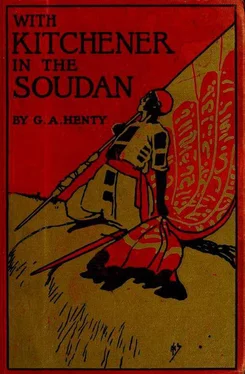Mahmud's own temper grew daily more sullen and fierce. His own fighting instinct was in favour of the attack his followers longed to deliver, but in his heart he was afraid that the result might be fatal. It was not the rifles of the infantry that he feared—of these he had no experience—but the artillery, which he had learned already could be used with terrible effect.
As Mahmud was drinking heavily, and as the fact that the white soldiers were near at hand added to the fanatical hatred of the emirs and tribesmen, Fatma sent a message by a slave to Gregory, warning him not to show himself outside the little shelter tent composed of a single blanket, in which he now lived.
At length it became known that the English host was approaching. As soon as the gun-boats brought down news that the Dervishes were no longer following the river-bank, but were disappearing into the desert, the Sirdar guessed their intentions. Nothing could have suited him better. A battle now must be a decisive one. There was no way of retreat open to the Dervishes except to cross the waterless desert, or to fly south keeping to the course of the Albara, which would take them farther and farther from the Nile with every mile they marched. Bringing up all his force, therefore, from Kennur and the Atbara fort, which one battalion was left to guard, the Sirdar took up his post at Hudi.
The position was well chosen. It lay half-way between Mahmud's camp at Nakheila and the Atbara fort, and left Mahmud only the option of attacking him or of making a long detour through the desert to the east in order to reach Berber. The British, on the other hand, could receive their supplies by camels from the Atbara fort. The cavalry went out to reconnoitre, and had constant skirmishes with the enemy's horse, but when day after day passed and Mahmud did not come, as the Sirdar had expected, to attack him, it was determined to take the offensive. General Hunter was ordered to move forward, with the whole of the cavalry and a Maxim-gun battery, to discover the exact position of the enemy.
The camp had been well chosen, for, like Abu Hamed, it lay in a depression, and could not be seen until an enemy came within six hundred yards of it. Thus the superiority of range of the British rifles was neutralized, and their guns could not be brought into play until within reach of the Dervish muskets. The wood was surrounded by a high zareba, behind which a crowd of Dervishes were assembled. They had anticipated an attack, and held their fire until the cavalry should come nearer. This, however, General Hunter had no intention of doing, and he retired with the information he had gained. His account of the strength of the position showed the difficulty of taking it by assault.
Next day he again went out with the same force, but this time the Dervishes were prepared. Their mounted men dashed out from the wood and galloped round to cut off the cavalry, while the foot-men crowded out to attack them in front. The cavalry fell back in perfect order, and one squadron charged forty of the Dervish cavalry, who barred the line of retreat. These they drove off, but the main body still pressed forward, and the Maxims opened upon them. The hail of bullets was too much for the horsemen, and they drew off. Several times they gathered again for a charge, but on each occasion the Maxims dispersed them. The unmounted Dervishes were soon left behind, but the horsemen, in spite of the lesson they had received, followed almost to the camp.
On the afternoon of the 7th of April the Anglo-Egyptian force marched out. They started at five in the afternoon, and halted at seven. The horses were first taken down to water, the infantry by half-battalions; all then lay down to sleep. At one o'clock the word to advance was passed round quietly. The moon was full and high overhead, so there was no difficulty in avoiding obstacles. Each brigade marched in square, accompanied by the guns and the Maxims, and the camels with provisions and spare ammunition.
At four o'clock they halted again. They had been well guided, and were now but a short distance from the enemy's position. At sunrise the men were again on their feet, and advanced to within two hundred yards of the position from which they were to deliver their attack. The British brigade —the Camerons, Warwicks, Seaforths, and Lincolns—were on the left. Next to them came Macdonald's brigade—the three Soudanese regiments in front, the 2nd Egyptian in support. Farther still to the right, and touching the river, was Maxwell's brigade, comprising also three Soudanese regiments and an Egyptian one. Two of the three Egyptian battalions of Lewis's brigade were placed on the left rear of the British brigade, the third battalion was in square round the camels. Two field-batteries were in front of the infantry and two to the right of Maxwell's brigade.
Half a mile from the zareba the infantry halted, and the artillery and Maxims opened fire. For an hour a tremendous fire was poured into the enemy's position, but not a shot was fired in reply, although the Dervishes could be seen moving among the trees, apparently unconcerned at the storm of shell and bullets.
Gregory's position had been growing more critical everyday. Food was extremely short; the scanty supplies that the force had brought with them had been long since exhausted, and they were now subsisting upon palm nuts. Of these, two were served out daily to each man, a quantity barely sufficient to keep life together. In spite of the vigilant watch kept by the more fanatical of Mahmud's followers, desertions had become frequent, notwithstanding the certain death that awaited those who were overtaken. The evening after the cavalry made their first reconnaissance the slave who brought Gregory's food told him that Fatma wished to speak to him. It was but three paces to the entrance of the tent, and his guards made no objection. The entrance was closed as the slave entered, but half a minute later it was opened an inch or two, and, without showing herself, Fatma said:
"Listen to me."
" I am listening," Gregory replied.
" I am in great fear for you; you are in much danger. The emirs say to Mahmud that you ought to be killed; their followers are well-nigh starving,—why should an infidel prisoner be eating? His friends are now close to us, and there will be a battle; none will be spared on either side,—why should this man be spared? Mahmud has many cares; the men are furious because he will not lead them out to fight. Even the emirs are sullen; and Osman Digna, who was on bad terms with him a short time ago, and who, Mahmud suspects, is intriguing with them against him, is foremost in urging that an attack should take place, though every one knows he is a coward and never shows himself in battle, always running away directly he sees that things are going against him. Still, he has five thousand followers of his own. Mahmud told me to-day that he had done all in his power, but, placed as he was, he could not withstand the words of the emirs and the complaints of the tribesmen. When the battle comes—as it must come in a day or two—it will need all his influence and the faith of the men with him to win; and with so much at stake, how can he risk everything for the sake of a single life, and that the life of an infidel? If you would agree to aid in working his guns, as the Greeks and Egyptians do, it would content the emirs."
"That I cannot do," Gregory said. "If I am to be killed it is the will of God, but better that a thousand times than turn traitor!"
" I knew that it would be so," Fatma said sorrowfully. "What can we do? At other times the protection of the harem would cover even one who had slain a chief, but now that the Baggara are half-starving, and mad with anger and disappointment, even that no longer avails. If they would brave the anger of the son of the Khalifa, they would not regard the sanctity of the harem. I wish now that I had advised you to try and escape when we left Shendy, or even when we first came here. It would have been difficult-but not impossible; but now I can see no chance. There is the thorn hedge round the wood, with few openings, and with men on watch all round to prevent desertion. Several tried to escape last night—all were caught and killed this morning. Even if it were possible to pass through, there are bands of horsemen everywhere out on the plain, keeping watch alike against the approach of the enemy and the desertion of cowards.
Читать дальше












